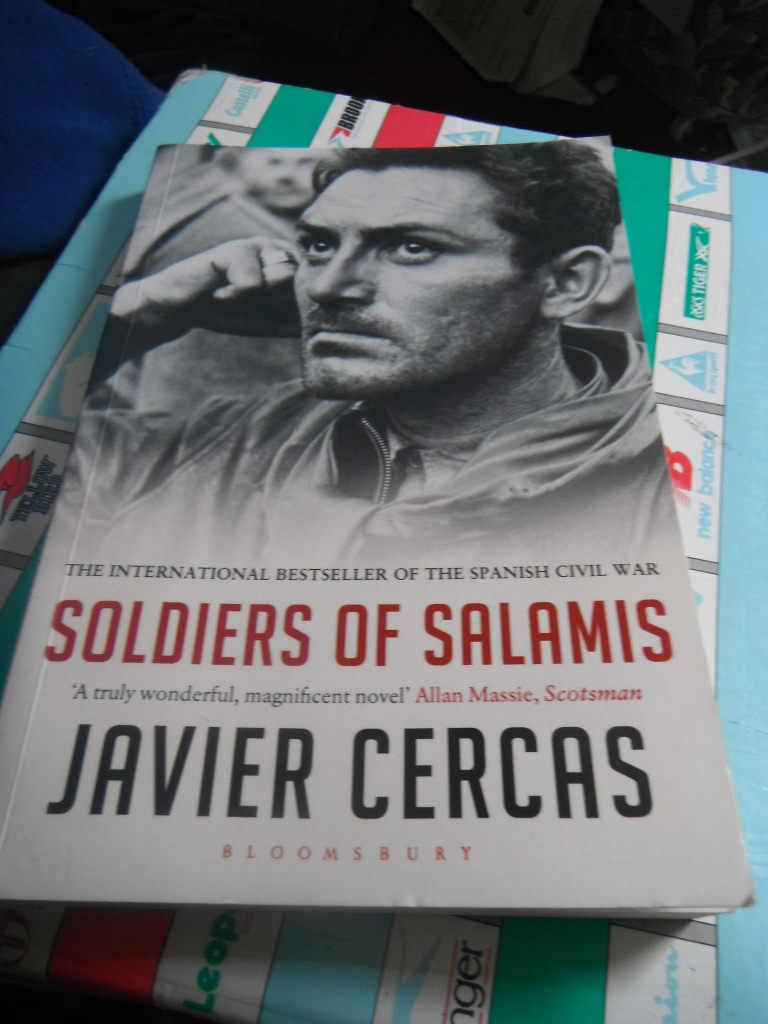Translated by Anne McClean
Spoiler alerts .

Fiction that runs remarkably close to truth and plays very much with the idea. Many of the named historic characters are real and Cercas the author presents the central narrator as Javier Cercas too.
Cercas in the novel, if not in life, is a struggling Spanish novelist, working in journalism reluctantly because his book career hasn’t taken off. Given an assignment relating to the Spanish Civil War, he stumbles on the remarkable story of Sanchez Mazas, a writer himself, and a founding father of Franco’s fascist regime. Mazas was captured by the Communists, and in the closing days of the conflict they had already virtually lost, they put Mazas in front of an execution squad, but they missed him, and he escaped into the nearby forests. He was spotted by one of the search party, but the mysterious stranger who could have shot him on the spot or summoned other Fascist supporters, let him go, and told the others the area where Mazas was hiding was clear.
Cercas sets out with some increasing obsession to learn the truth of what happened and why, realizing that many regarded the events as too old to matter any more (the book is set 60 years after the war), and others don’t want old wounds reopening. Cercas is torn between tracking down survivors to interview and simply fictionalizing the gaps in his scant knowledge.
This is as much about the writing craft as it is war story and warning against the attractions of right wing extremism. Both Cercas and Mazas are struggling authors. Mazas had some success but then fell into decline before setting out many manifesto ideas for Franco’s regime. Cercas finds himself given hope of some literary success in rejecting his dreams of being a novelist for penning non-fiction.
Ultimately, he meets Miralles, who may or may not be the man who let Masaz go alive, (a claim Miralles denies though evidence that he met Mazas at that time is strongly indicated by both men sharing a fixation on a particular Pasos Dobles song, Sighing For Spain). Miralles has no desire to be seen as a living hero. He believes the only heroes in war are those who die on the battlefields.
Much here is reminiscent of Sartre’s French classic Nausea. Both books are about how we don’t record objective history but subjectively create it. The truth remains elusive, while the book makes it clear that Cercas (the novel’s author) is very much opposed to the fascists. In the middle section of the novel, Mazas is treated with some sympathy as we see his rise and fall within Franco’s power circle. I was reminded in many ways of Christopher Isherwood’s Mr Norris Changes Trains, about a despicable monster with charm and appeal. The closing portion of the book restores balance as we get a true sense of the struggle through the high likable Zorba-esque mischievous Miralles, who flirts outrageously with the nuns who tend to him in the retirement home and has Cercas smuggling cigarettes in for him while reflecting that the real heroes are those forgotten men (and women) no one remembers or writes about.
A strong look at the creative process, and the effect not getting work recognized can have on a writer. Mazas seems to have been driven to extremism from bitterness at his sense of his own genius not being as recognized as he wished. Cercas adapts and changes what he writes and how he writes it, staying tenacious in his often seemingly doomed quest to uncover the truth. As a writer myself it is this side of the multi-faceted work that stands out.
The cover art is a straight-forward photo of a serious-looking soldier in the Spanish Civil War. The novel has been filmed, though the film apparently changes the gender of the narrator.
Though they are currently in some Hiatus due to Covid, this book was kindly loaned to me by the University Of Central Lancashire (UCLAN) Language & Literature Department Worldwise Learning Centre Book Club group, for which I am very grateful. https://www.uclan.ac.uk/faculties/worldwise
Arthur Chappell